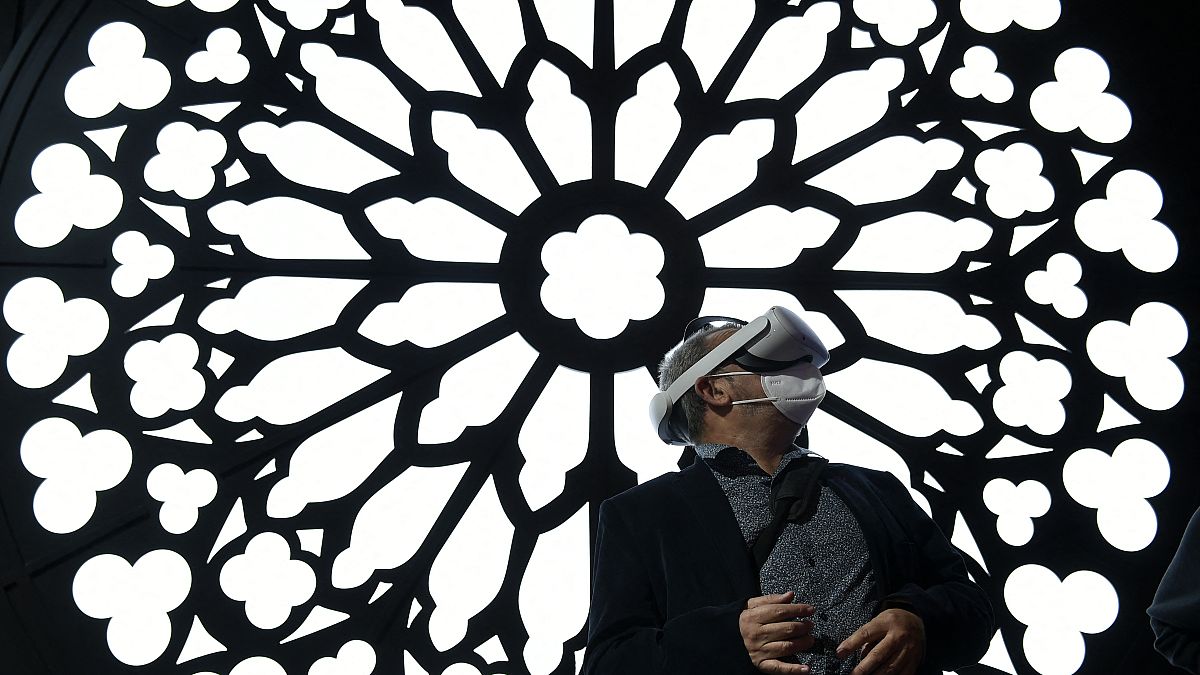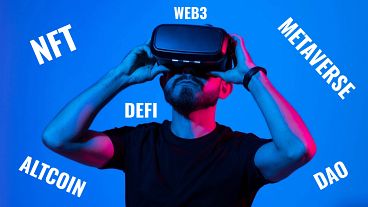Telco, tech and policymakers will have to work together to build the virtual world.
Attendees at the Mobile World Congress in Barcelona were transported into the metaverse and could either ride on SK Telecom’s display that featured a giant swooping robot arm while wearing Virtual Reality (VR) headsets, or at the Orange stand they could even travel virtually to Paris to see the Notre Dame cathedral.
Telecom companies are turning their attention to the metaverse, an immersive virtual world that is yet to fully exist but is seen by some as the future of how we will work, socialise and connect. However, how their technology will work with the metaverse and how it will be regulated are questions that are still unanswered.
“Telcos will be the entry point for the metaverse, the entry point because of connectivity, but also because of customer relations, the customer wants access to a digital world,” Michaël Trabbia, chief technology and innovation officer at Orange told Euronews Next.
“Customers buy devices from us, smartphones today, glasses maybe tomorrow, and they also trust us to guide them into this digital world,” he said, adding that Orange is having a lot of talks with groups that are working on the metaverse and is speaking with Meta about what it can expect from operators like Orange.
“Now you have fibre, you have 5G, so you have the connectivity that is ready for the metaverse and that can still be upgraded with edge computing capabilities because we know that for metaverse the computing part will be absolutely critical and you will need to add computing capabilities close to the user of the Metaverse.
“And this is something that we can bring thanks to our own networks,” he said, adding that the metaverse is an opportunity to develop new technologies such as new Artificial Intelligence (AI) capabilities.
However, Trabbia said there is a lot of work to do in building the new technologies needed and in interoperability.
5G is not enough
In fact, 5G will not be enough to support the metaverse, said Cathy Hackl, who is known as the “Godmother of the metaverse” and is the chief metaverse officer at the Futures Intelligence Group.
“When you're talking about the metaverse and telcos, you're talking about multiple, I mean, millions of billions of devices together looking at content in virtual spaces in the physical world,” she told Euronews Next.
“You need latency, lower latency, you need more bandwidth. You're talking about seamlessly blending the physical world with the virtual world. And that in itself is going to take more than 5G. That's going to take 6G, WiFi 6, and edge computing”.
The massive metaverse market
Glimmers of the metaverse have already surfaced in gaming and despite the new virtual world not being quite here yet, the market is predicted to reach $814 billion (€734 billion) by 2028.
Much of the reason for the hype is because remote and hybrid working has led to a massive transition in the way we work and socialise behind a screen.
The metaverse could push our remote experiences even further by presenting a more immersive world where we connect and telecom companies will be key to this.
“There are a number of areas where telecom executives are investing around the metaverse today,” Brian Smyth, innovation lead for Accenture's Communications and Media industry told Euronews Next.
“Their focus is largely around defining their metaverse strategy, building the right teams and skills for this new technology and developing partnerships to support their role and value in the metaverse”.
Making the metaverse a safe space
But the main questions tech and telco companies are asking are around data and personal security and regulation.
There have already been reports of harassment and assault in virtual worlds and how it will be regulated by policymakers is still unclear.
“The metaverse is like the real world, and you don't want bad things to happen in the metaverse as you don't want them to happen in the real world,” said Trabbia.
“This means that there will be a lot of thoughtand technology also to make sure that the metaverse is a safe place, as without it, it will not I boom for sure”.
But Trabbia said it was not just down to tech companies and telcos to solve those issues.
“We need to have and we support regulation that enforces a safe place to be,” he said adding that he welcomed the European Union’s Digital Markets Actregulating the digital world.
The sentiment of policy and regulation being shared by companies and governments was also echoed by the director of the Digital Future Society think-tank Cristina Colom.
"Both public administrations and the technology sector should work together before actually implementing the metaverse to guarantee that in that legislation, in those codes of conduct, our rights are really protected, our security and our privacy are protected,” she told Euronews.
“So that the day we can actually enter the metaverse, this is already protected and guaranteed".





